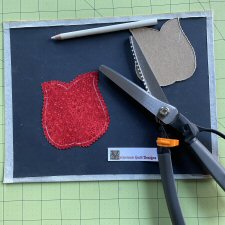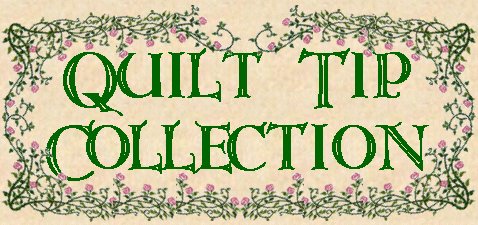|

| |
I
had a small lipstick case with a mirror for my purse. I replaced
the mirror with a magnetic strip and now use it as a thread &
needle case for my take-along sewing..........submitted by
Terri |
| |
|



[Click
the Topiary Bullets to open the Quilting Tip pages into a new browser
window.]







 |
Block
finished blocks with a pencil line on the back, the size of the
finished block. Using these lines as sewing lines to finish your
quilt top, gives a finer finished quilt. |
 |
When
pressing a block with many points meeting at the centre, trim
and fan the joining seam allowances out. Put a few drops of water,
at the centre and press. This will help the centre lay flat. |
 |
Tea
Dye fabrics to dull the colour and give them and aged look. |
 |

Cut
the curved edge of appliqué patches with pinking shears. This
avoids the need to clip them. |
 |
Spray
starch is a great addition to your quilting supplies. You can
use it to stiffen lightweight fabrics and to hold down hard to
press appliqué seam allowances. |
 |
Large
cone threads can be used on sewing machines with the thread spool
pins that stand vertically. Place an empty pen over the pin, to
extend the height. |
 |
A
small ironing board placed to the side of your sewing machine
allows for pressing, as you sew, without the need to stand up
and walk over to your larger ironing board. |
 |
When
sewing practice blocks for different quilts, use the same grouping
of fabrics (e.g. Christmas fabrics). Save these blocks until you
have enough for a quilt. |
 |
Use
your leftover strips and squares to piece together a small lap
quilt for charity. |
 |
A
scrap piece of fabric sewn through, before and after chain piecing.
It anchors the threads and prevents the machine from eating up
the edges of your fabric. |
|













